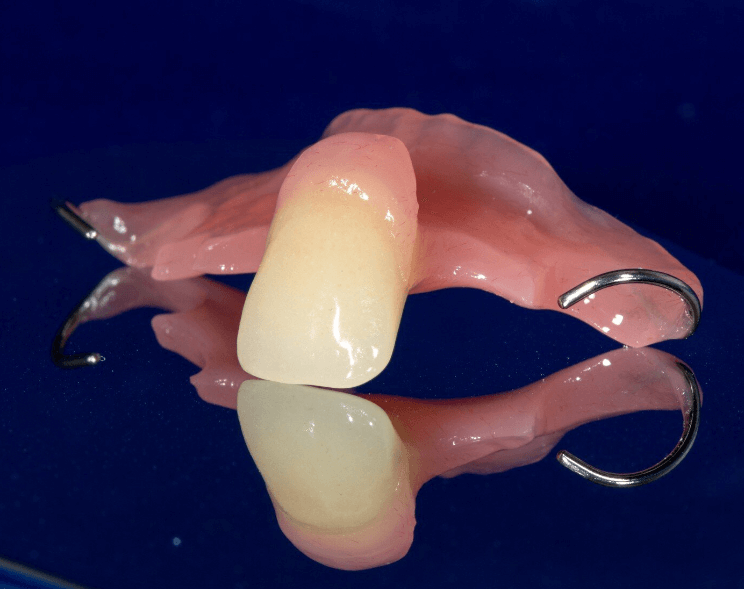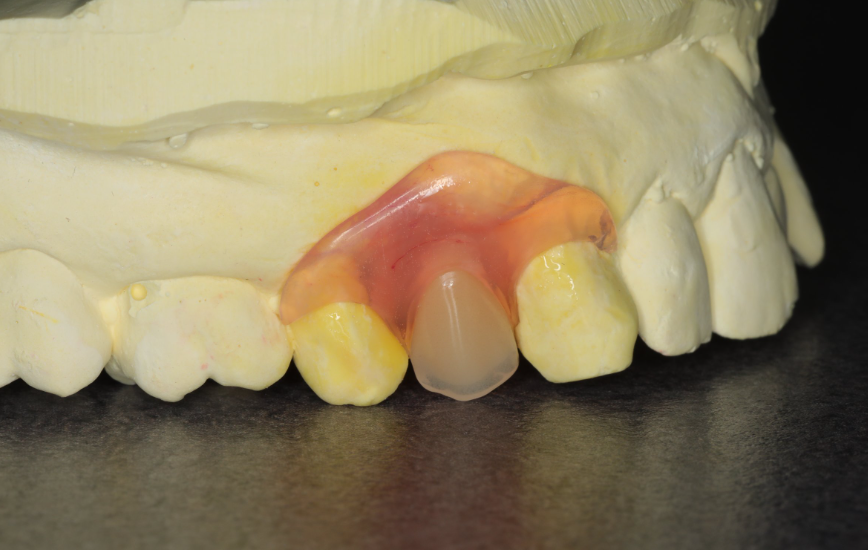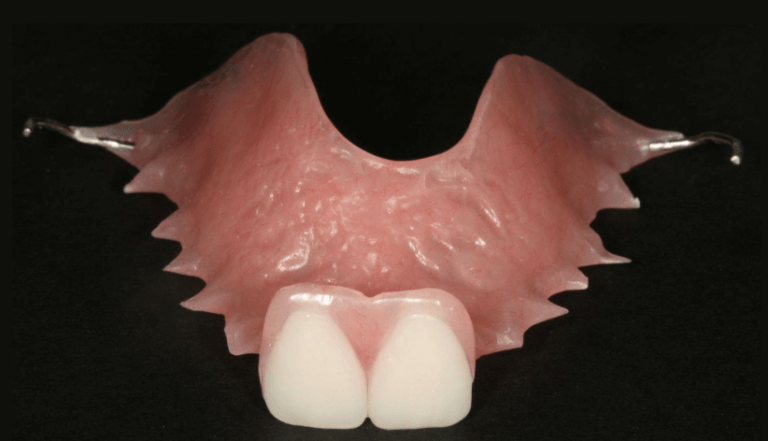Single Tooth Denture

What Is A Single Tooth Denture?
A Single Tooth Denture is a custom-made, removable dental prosthesis designed to replace one missing tooth. Unlike full dentures, which replace an entire arch of teeth, this solution specifically targets a single gap in your smile. Often crafted from acrylic or flexible materials, it is lightweight, natural-looking, and easy to use.
Before deciding on whether A Flipper Denture are right for you, there are some things you should know:
- Who Needs A Single Tooth Denture?
- Benefit Of A Single Tooth Denture
- Alternative Treatments To A Single Tooth Denture
- How Much Does A Single Tooth Denture Cost?
- Steps In The Single Tooth Denture Procedure
- Frequently Asked Questions About Single Tooth Dentures
If you have any further questions about A Single Tooth Denture or other dental services offered at Atlas Dental, please contact us.

Free Phone Consultation
Have questions about cosmetic dentures for missing teeth? Book a free phone consult with our Toronto dentist

5 star google reviews
Our patients love their cosmetic looking denture smile! See for yourself why patients choose Atlas Dental.

Book a denture appointment online
We make custom fitted dentures to help our patients smile confidently again.
Who Needs A Single Tooth Denture?
A Single Tooth Denture is ideal for individuals who:
- Experienced Tooth Loss from Trauma: Sports injuries or accidents can lead to tooth loss, making a flipper denture an effective temporary or permanent solution.
- Suffered from Severe Tooth Decay: When a tooth becomes irreparable due to decay, a single tooth denture can fill the gap and prevent misalignment.
- Had a Root Canal Failure: If a root canal treatment doesn’t succeed, a flipper denture is a quick and affordable way to replace the extracted tooth.
- Are Managing Gum Disease: Advanced periodontal disease can lead to tooth loss; a single tooth denture offers a simple way to maintain oral functionality.
- Want a Less Invasive Option: For patients unable or unwilling to undergo surgical procedures like dental implants, a flipper denture provides a non-invasive alternative.
It is important to note that even if you are missing only one tooth and it might not seem immediately noticeable, ignoring its replacement can lead to potential oral health issues. When a tooth is lost, adjacent teeth may shift, altering the bite alignment, which can cause problems like TMJ disorders and difficulty in chewing. If you have further questions about Single Tooth Dentures, please contact us.

Benefits Of A Single Tooth Denture
A Single Tooth Denture offers several significant advantages that make it an appealing option for individuals seeking to replace a missing tooth:
- Natural Appearance: Custom-crafted to match your existing teeth, ensuring a seamless look.
- Enhanced Functionality: Restores your ability to chew, speak, and maintain proper oral hygiene.
- Prevents Misalignment: Stops neighboring teeth from shifting into the empty space, preserving bite alignment.
- Affordable Solution: Generally more cost-effective than dental implants or bridges.
- Non-Invasive: No surgery required, making it suitable for patients seeking a simpler option.
- Quick Fabrication: Can often be designed and fitted in a short time.
- Removable and Adjustable: Easy to repair or modify as needed.
It’s important to note that while Single Tooth Dentures offer numerous advantages, they may not be suitable for everyone. Your dentist will evaluate your oral health, overall dental condition, and specific requirements to determine the most appropriate tooth replacement option for you. If you have further questions about Single Tooth Dentures, please contact us.
Alternative Treatments To A Single Tooth Denture
If a single tooth denture isn’t the right fit for you, here are other options:
- Dental Implants: A permanent, durable replacement that mimics natural teeth.
- Dental Bridges: Fixed prosthetics supported by adjacent teeth.
- Essix Retainers: Transparent appliances with a tooth replacement.
- Valplast Dentures: Flexible, metal-free partial dentures for a more natural look.
Factors such as the health of surrounding teeth, jawbone condition, budget, and personal preferences should be taken into account when choosing the most appropriate tooth replacement option. If you have further questions about Single Tooth Dentures, please contact us.
Cost of Partial Dentures
Partial Dentures can range in cost from $474 to 1454 plus dental lab fee, depending on the type of partial denture. Example of denture codes found in the Ontario Dental Association’s Suggested Fee Guide appear as follows:
Dentures, Partial, Acrylic Base (Provisional). (e.g. Single Tooth Dentures, Essix Dentures)
- 52101 – Maxillary: $474 + Dental Lab Fee
- 52102 – Mandibular: $474 + Dental Lab Fee
Dentures, Partial, Polymer, Resilient Retainer. (e.g. Valplast Flexible Partial Dentures)
- 52201 – Maxillary: $695 + Dental Lab Fee
- 52202 – Mandibular: $695 + Dental Lab Fee
Dentures, Partial, Acrylic, With Metal Wrought/Cast Clasps and/or Rests. (e.g. Acrylic Partial Dentures)
- 52301 – Maxillary: $794 + Dental Lab Fee
- 52302 – Mandibular: $794 + Dental Lab Fee
Dentures, Partial, Cast Metal Frame/Connector, Clasps and Rests. (e.g. Cast partial Dentures)
- 53101 – Maxillary: $1454 + Dental Lab Fee
- 53102 – Mandibular: $1454 + Dental Lab Fee
Partial Dentures are sometimes considered a supplementary service by dental insurance plans and may or may not be covered by your dental insurance. Be sure to find out from your dental insurance plan provider how much you are eligible for before going ahead with dental treatment. Your dentist can help you submit an predetermination to your dental insurance. Our fees are consistent with the ODA Fee Guide.
For patients without dental insurance, Atlas Dental is pleased to offer dental financing through iFinance Dentalcard. Affordable payment plans start at 7.95% for terms of 6 months to 6 years. To learn more about Dentalcard dental treatment financing, follow this link.
Steps In The Single Tooth Denture Procedure
The typical procedure for getting a flipper denture are as follows:
- Initial Consultation: Your dentist examines your oral health and discusses your goals.
- Impressions: Molds of your teeth are taken to create a custom-fit denture.
- Denture Fabrication: The denture is crafted in a dental lab based on the impressions.
- Try-In and Adjustments: A fitting session ensures the denture is comfortable and functional.
- Final Placement: The denture is finalized, and care and maintenance instructions are given.
- Follow-Up: Adjustments are made as needed to optimize fit and comfort.
Remember that proper care and maintenance of your flipper denture are crucial for ensuring its longevity and preserving your oral health. If you have further questions about single tooth partial dentures, please contact us.

Frequently Asked Questions About Single Tooth Dentures
- How long does a single tooth denture last?
With proper care, a single tooth denture can last 5–7 years. Regular dental check-ups ensure it remains in good condition.
- Can I eat with a single tooth denture?
Yes, but start with soft foods and gradually reintroduce harder textures as you adapt.
- Is a flipper denture noticeable?
Flipper dentures are custom-made to match your natural teeth, making them virtually undetectable.
- Will dental insurance cover a single tooth denture?
Many dental insurance plans provide partial or full coverage for dentures, including single tooth options. Check with your provider for specific details.
Don’t let a missing tooth hold you back from feeling confident and comfortable. A single tooth denture is an affordable, effective, and non-invasive solution tailored to your needs. Contact us at Atlas Dental today to book your consultation and discover how we can help you smile brighter!

